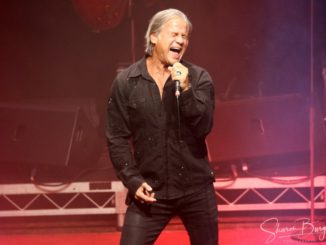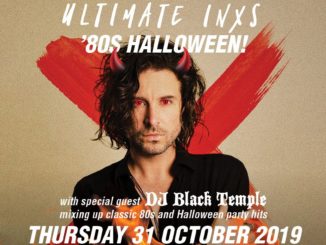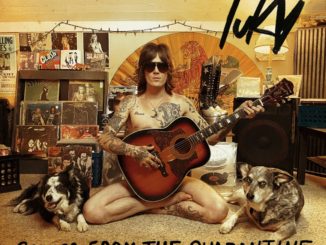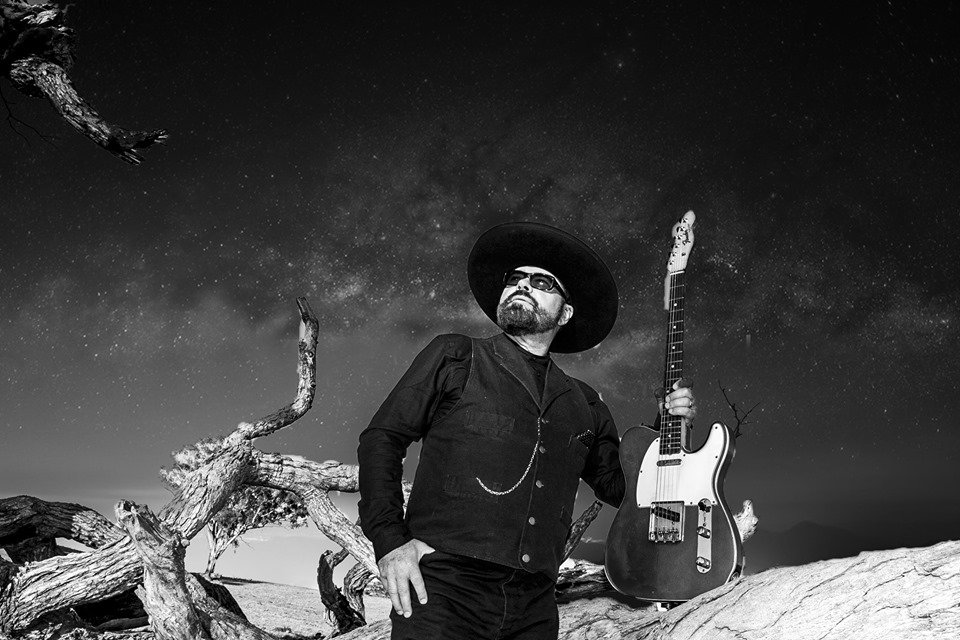
In the late 80’s and early 90’s INXS were one of the planet’s hottest properties, with #1 hit singles all across the world, selling out shows wherever they went and have sold in excess of sixty million albums to date. Andrew Farriss, along with long time co-writing partner, the late Michael Hutchence, penned some of the most recognisable & memorable hits to ever come out of Australia, with their catchy rock & pop creations that managed to catapult the boys from Perth to universal stardom. Farriss is back with a new track & debut solo single ‘Come Midnight’ and although it tips the hat more towards a country feel, it’s interesting to note that he wrote it shortly after writing the 1987 album ‘Kick’, which some see as INXS’s best works. The Rockpit had the honour of securing some talk time with Andrew to discuss the new single, visiting Nashville and getting nervous when he meeting the Australian Cricket team many years ago…
Sean: Hi Andrew, It’s Sean from The Rockpit over here in Perth. How are you doing?
AF: Hi Sean, I’m good thank you. How are you?
Sean: Really well thank you. Firstly, congratulations on the new single ‘Come Midnight’. I’ve had it in my hands for the last day and a half and it’s got such a catchy riff to it, even though country isn’t the first style of music I would have myself listen to I’ve got to say that I’ve really enjoyed it.
AF: I really appreciate that. Wow, a day and a half? You must be sick of it by now [laughs]
Sean: [laughs] Not at all. I’m kind of picking up a Hank Marvin/Shadows kind of sound and feel to it…
AF: You’ve kind of hit the nail on the head there… that’s exactly what I had in mind because you just don’t hear that sort of thing much anymore. To me the riff in that song is almost as important as the vocal; to the point of it has an attitude to it. And that’s the only track I’ve done that has that length of writing involved in it. Some of the others I’ve written for the new album, that will be coming out next year, do have similar riffs like that but it was ‘Come Midnight’ that really started the ball rolling and got me wanting to go there. It’s almost pre-Beatles or surf music… it’s also got that wonderful Johnny Cash thing going on too and I was always a big fan of that kind of thing.
Sean: I think it’s going to tick so many people’s boxes because it does have that feel of so many different influences in there…
AF: That’s good. Thanks mate. I appreciate that. So what’s it like over in the West at the moment? I miss the West because I come from over there originally.
Sean: It’s great at the moment. The music scene is strong here right now, with a few new venues opening up, which is obviously great for live music. Fremantle is very vibrant too with lots going on so it’s all in a real good place.
AF: That’s great to hear. Not only was I born in Perth… near Cottesloe Beach actually, down near the Old Women’s Hospital that the Americans built during World War Two… well, I think that’s where I was born – I can’t ask Mum & Dad because they aren’t here anymore unfortunately but I still have a lot of affection for the West and most of my early years and life with my family was spent there. Then we came back to perform as a band in the early years, as you well know, as INXS although we were known as The Farriss Brothers back then.
Sean: Since I’ve been with The Rockpit I‘ve been honoured to talk to so many artists who have helped shape and create some of Australia’s finest music and with INXS being such a big influence around the world it really is an privilege to be able to talk to you.
AF: Thanks mate. Thank you.
Sean: But we digress because really I need to ask you more about ‘Come Midnight’ and also the start of your solo career. I see you kicked things off in Nashville at the legendary Bluebird Café which I read has just twenty tables and ten bar stools available for booking. It must be so intimate. What was that like to play there?
AF: I have to be honest, I was pretty nervous about it because it’s literally right in your face. There is no-where to hide but it was really good. First of all I have to say the scene in Nashville is quite incredible and has been for some time. It’s a refuge in many ways, for people who like to play their instruments in an old school sense and the kind of instruments that they play vary from… well, you name it and they play it. Blue grass & country and that sort of thing are aplenty. When you get into that town you suddenly realise just how infectious it is because there is this amazing eclectic group of musicians that have all sort of flocked there and I honestly can’t think of anything else I’ve seen in all my years that I can compare that too, especially in an era that is so technology driven. It’s really interesting that people have flocked there like a Mecca and that’s not even talking about song writing. There’s such an amazing talent pool in that area – it’s incredible.
Sean: I have interviewed a few artists who have now relocated there because they felt drawn there.
AF: And I can understand that. My wife Marlina & I have gotten to know quite a few people there, especially over the last five or six years. I have spent some time songwriting there and we’ve made some really good friends. There’s obviously a professional association with me as a songwriter but also their partner’s wives and friends become our mates. It must be really spooky for the locals because there is a lot of development and that’s not just from the influx of creative people & musicians, it’s also developers who see an opportunity to build everything. I think it’s a double edged sword – on one hand it brings prosperity to the area but also it must feel a little odd to the locals.
Sean: It would be awful if too much commercialism took away that wonderful vibe the place clearly has.
AF: Yeah, that’s exactly right. To me, there has always been an ebb & flow to ‘scenes’ over the years. I can remember the pub scene in Australia, as we were talking about just now, was so virulent & active and everywhere you went people were playing live music.
Sean: And like I was saying we are seeing some of these smaller, boutique kind of venues opening which is great and they have that almost underground kind of feel which is wonderful.
AF: That’s nice… that’s really good to hear and it’s important too. To me in this era, technology is amazing for younger people because they have an opportunity or platform, if they research it properly, to get their music out there for people to hear. But nothing beats playing live because it really tests you in every way possible and the main reason for this is because it’s in real time.
Sean: You mentioned there’s an album to follow next year, have you got much material gathered for it?
AF: Yeah, I do. I’ve been working for some time on this project or album. I think what it was, was I was struggling a little bit when I started writing by myself as Andrew Farriss rather than as a co-writer with other people both in Australia & the US. When I started working on this I wasn’t quite sure what I wanted to write about – what did I want to say. Did I want to share personal views or thought on things? As its gone along I’ve got much more focused now and what helped me was that I stopped thinking about everything having to be super-modern in the sense of writing about everything that’s happening in 2019 or 2020 and I started to think about what was it that inspired the original people like your Johnny Cash’s and Willy Nelson’s and Bob Dylan’s… all those early greats. What was going on before their time and I’m not just talking blues… even folk music. What instruments were people playing? What was life like for people back then? And that journey is where my album has kind of gone and I’ve started to go back much further to probably the late 19th century, which is where I’ve got a lot of my inspiration from and started to do a lot of research about what went on in Australia, what went on in America & other parts of the world and so the fusion of these old instruments like the mandolins & banjos, fiddles and other acoustic instruments, even classical instruments like flutes are what interests me to how they have morphed into modern day.
So I found I got more and more focused as a writer when I realised that I had to stop thinking about the 21st century and go earlier to get those inspirations and I sort of invented characters on my album if you like… I won’t rattle them all off but a lot of 19th century culture, especially Australian outback culture or American Western cowboy culture I wanted to know what they were like back then and all those things are what determined what would happen next in the 20th century. That, in turn with technology, is where we are now. For me it’s about that fusion of cultures & characters that would have been riding around on horses before cars and so I started writing about that. So I tried to forget about uber-modern technology and go back in time where it wasn’t like now. Marline & I had some good friends who lived down on the Mexican border on a ranch some time ago and we used to go riding all through those national monument areas. I now know exactly where Geronimo surrendered to the U.S. Cavalry, we went to Cochise’s Stronghold… we rode to these on horseback because you can’t walk there. They are quite desolate remote areas and interestingly enough those areas are down near Highway 80 near Tombstone, where the old Cowboys were with the Mexicans & the Apaches. That’s why I started writing about it – to me it’s the embryonic part that gave us the genre of country music and what kick started me to write this.
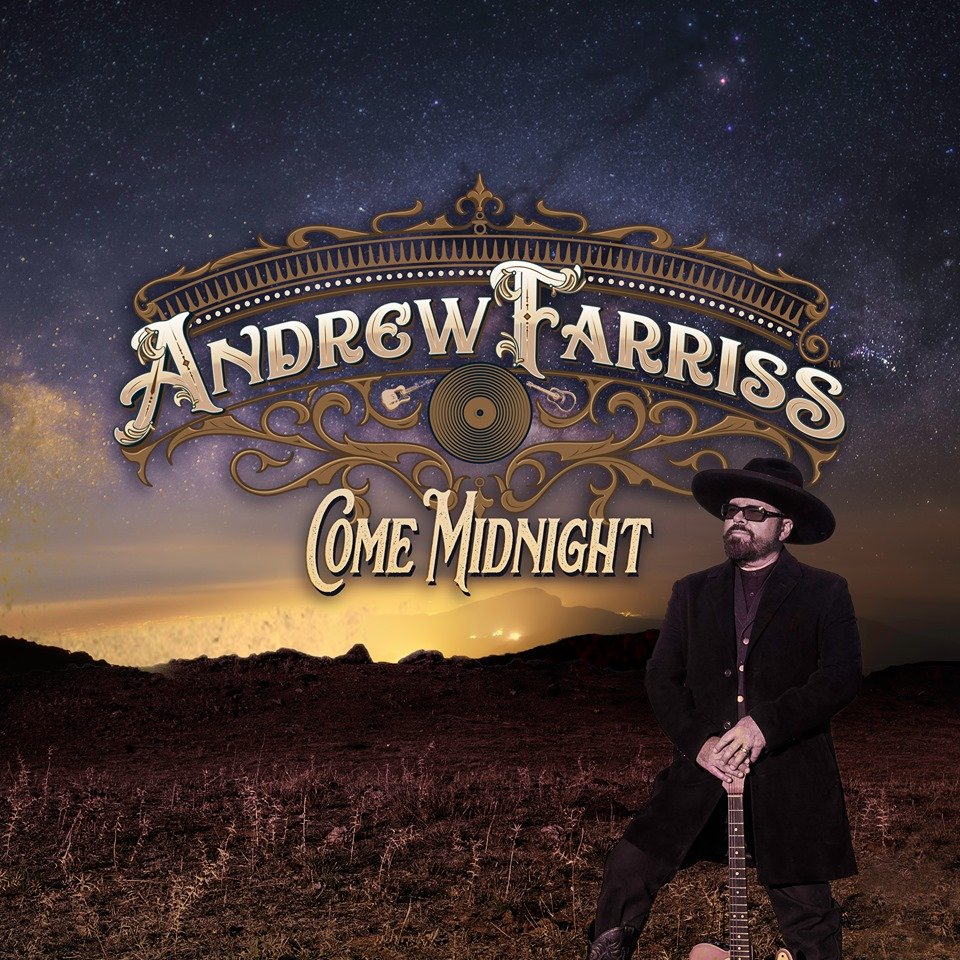
Sean: I’ve tried to stay away from discussing INXS but you used the word ‘kick’ there which leads me nicely to ask about the fact that ‘Come Midnight’ was created just after you had written your iconic ‘Kick’ album back in 1987. Were you tinkering with others styles & genres back in the late 80’s?
AF: [laughs] Yeah, look I’ve always been a tinkerer. I was asked the other day if I was interested in engineering. I thought he meant audio engineering but he was talking about mechanical engineering. That was really astute of him because I’m fascinated about how things are constructed and not just within music. I find construction in anything really interesting… I know it sounds crazy but things like bridges & buildings – I’m in awe of some of these man-made things and the physical technology they have used to put these things together. It’s really incredible. But back to the song, yes I was messing around with those guitar riffs that we were talking about before and I had some of the basic chords and ideas back then but I didn’t really finish the song and arrange it properly until quite recently, in fact it would have been earlier this year. Even though I finalised it in January of this year, back then when I was writing it, it was like something from outer space – I was working with synthesizers & guitars and trying to come up with what was dance music back then, using early samplers & technology that you can hear all over the radio now. I did enjoy the technical journey of it but I was also so passionate about songwriting – I like those riffs on the newer stuff and the simplicity of the music. In the earlier times the music was often more important than the vocals.
Sean: I’m not a musician and I remember saying to a friend about how simple some of The Beatles songs sounded and he told me they might sound simple but they are quite complex to play…
AF: You’re quite right – Absolutely. There have been some incredibly clever people in the last fifty or sixty years who have done some insanely talented things and the only reason we know about it is because technology has been able to send these things out to people all around the world. In an earlier time it didn’t exist for people to have that awareness. It had to either be written in musical notation or performed live.
Sean: I’ve discussed the dread ‘Spotify’ in the past and yes it can be the harbinger of doom with the paltry amounts that the artist receives from the streams & plays but it also has this incredible power that allows me to hang up after this call and immediately listen to something you may have recommended that I’ve may never have even heard of before, so that again is a double-edged sword. You just hope that the listener enjoys it so much that they then go see the artist live and support them at the merch table.
AF: Exactly. Technology has become a mixed blessing in that respect.
Sean: Before I lose you I would just like to ask you a couple of my more regular questions if I may…
AF: Of course.
Sean: If you could ask three guests from the music world, past or present, to join you for dinner, who would you like to invite?
AF: Well, the first person would be my wife Marlina and I’ve been very fortunate to have many mates who have been musicians who I have had dinners with… some incredible people. My wife & I are fans of J.J Cale so I would love to have had the chance to talk to him. It’s such an interesting question – there are so many interesting people. There are some legendary people who I’ve met over the years that have surprised me as to what they are really like in person. You fantasise what someone is going to be like but doesn’t always mean you get on with them. I watched an amazing special about James Brown the other night on television with Mick Jagger talking about him – incredible stuff so he would have been an interesting character. I’d like to talk to Neil Diamond. Beck is someone else I’ve met before but I’ve never had dinner with him – I’ve met him a couple of times backstage in the old days and always got on with him well. He covered the entire Kick album come to think of it.
Sean: I think because you’re Andrew Farriss and for what you have contributed to the music industry you can have as many as you want at your table [laughs]
AF: [laughs] Thanks mate. That sounds good.
Sean: I know we’ve overrun on our time and I don’t want to hold you up for your next interview but I have to mention I missed you guys when you played Wembley in 1991 on the ‘Live Baby Live’ tour in front of 74,000 but two years later on 10th April 1993 I got to experience INXS at Metropolis in Fremantle. I still have the ticket stub and it still sticks out as one of the most incredible gigs I’ve ever been to.
AF: Wow, that’s great… wait a minute – I think that was the same time that Australia was playing cricket against South Africa. I’m pretty sure because the Australian cricket team were staying in the same hotel as us. I remember going downstairs for breakfast and Dean Jones was there and I was always a big fan of those heavier cricketing guys… the big heavyweight people. Next minute Alan Border is there too, along with Steve Waugh & Mark Waugh and I started freaking out [laughs] and they came over and asked if they could sit down… next thing you know I’m having breakfast with the Australian Cricket Team [laughs] How did that happen? You know sports people and entertainers who travel a lot for their work, in a weird way it’s a very similar lifestyle.
Sean: What a great story to end with Andrew. It’s been a pleasure to talk to you.
AF: Well, hopefully if the album does well enough and I can put a decent tour together I’d love to come back over to the West to play.
Sean: It would be great to have you back over here to see us. You’ve had an incredible career so far Andrew and we wish you all the best for your new solo venture, as well as wish you success with ‘Come Midnight’. I’m looking forward to hearing the album.
AF: Good to hear & thanks for talking to me. Good on ya, Sean.
Sean: Thanks mate.

